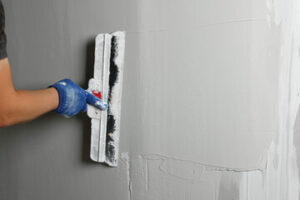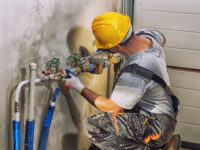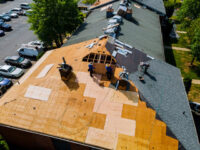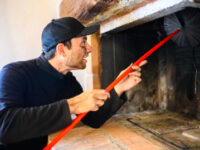How to Choose a Drywall Repair Contractor
Drywall is a common material for walls and ceilings in homes. It can be damaged by many things, from tiny dents to large cracks. Drywall Repair Las Vegas can handle some drywall repair tasks. Still, larger repairs like those involving water damage or structural issues are better left to a professional. To help you choose a trustworthy contractor, consider these factors:
 Drywall is a crucial element in the structure of homes and offices. The quality of the drywall is usually an indicator of a home’s overall condition and value. Drywall damage can be costly if not repaired properly. Drywall contractors can save homeowners money and time by repairing drywall quickly and effectively.
Drywall is a crucial element in the structure of homes and offices. The quality of the drywall is usually an indicator of a home’s overall condition and value. Drywall damage can be costly if not repaired properly. Drywall contractors can save homeowners money and time by repairing drywall quickly and effectively.
When hiring a Drywall Repair Contractor, it is important to choose one with enough experience to handle your project. Generally, more experienced contractors are more skilled and offer better services than newer companies. In addition, they are more likely to have the necessary tools and training to perform quality work.
Many homeowner’s assume they can perform a drywall repair themselves, but this is not always the case. Depending on the extent of the damage and the type of repair, a homeowner may need to purchase a complete drywall repair kit that includes patches, sandpaper, drywall tape, and mud. In addition to these materials, a homeowner will also need to rent or buy special tools that are not readily available at most hardware stores.
The process of repairing drywall can be very time-consuming for amateurs, especially if the repairs are extensive. Moreover, it can be very expensive for a homeowner who makes mistakes during the process and has to repeat the repair.
While some drywall damage is minor and can wait until a later date for a professional to fix, other damage must be addressed immediately. For example, any holes or cracks in drywall that allow small children and pets to reach or climb into wall space are safety hazards and must be covered up until the professionals can repair them.
It is important to find a drywall repair company that offers free estimates. This will give you an idea of what the job will cost and will help you make a comparison between different companies. The best drywall companies will provide quotes that are detailed and include information such as the time frame for the job, cost of materials, and any other relevant details.
It is also important to find out how the drywall repair company handles payment. Some businesses prefer to receive cash, while others will accept credit cards or checks. You should also find out how much the company charges for a refundable deposit. Finally, it is essential to know if the drywall company cleans up the work area when it is completed. This will ensure that there is no mess left behind and prevents the need for a homeowner to clean up after the workers leave.
Customer Reviews
A good drywall repair contractor will be one who has a solid track record of providing quality work with excellent customer service. You will want to choose a contractor who is willing to listen to your concerns and answer your questions honestly. They should also communicate clearly and set reasonable expectations for the project. If they don’t respond in a timely manner or cancel appointments, you should look for another contractor.
The cost of a professional drywall repair depends on the type of repair and the size of the area that needs to be repaired. For example, repairing nail holes or small chips is a relatively straightforward task for the average homeowner and can be done for around $30 in materials (more for whole sheets of drywall that need to be replaced). On the other hand, cracks or larger holes require a patch cut from a piece of spare drywall that must be taped, mudded, and sanded before being painted. The cost of this type of repair is typically $60 to $90 per hour.
Most homeowners will only consider hiring a drywall repair contractor for major repairs, such as replacing an entire wall or ceiling, or if they have extensive damage that would significantly reduce the value of their home. However, even minor damage should be repaired as soon as possible to prevent water leaks and mold growth.
Those who decide to hire a drywall repair specialist will typically look for reviews from previous customers to determine whether the company is trustworthy and reliable. The reviews should indicate how quickly the task was completed, whether or not the company cleaned up afterward, and if there were any problems with the work.
It’s also important to keep in mind that a poorly done drywall job will often result in further damage, costing you more money in the long run. For this reason, it’s generally better to spend the extra money to hire a professional drywall repair contractor from the start. Otherwise, you may find yourself sanding and repainting your walls or ceiling again in the future.
License
Drywall, also known as wallboard, plasterboard, and sheetrock is one of the most popular building materials for walls and ceilings. It is easy to install, pliable, and provides great texture. It also protects insulation, ductwork, wiring, plumbing, and dampens sound. Drywall contractors install and repair drywall in homes and businesses. They may specialize in certain types of work. The required qualifications for becoming a drywall contractor vary from state to state, but most require at least a high school diploma and on-the-job training. Some states also require licensing and bonding.
The responsibilities of a drywall contractor include building, painting, and patching a wall or ceiling. They may also be responsible for installing electrical wiring and ensuring that the wiring is safe. In addition, they should be able to handle a wide variety of tools and equipment. Drywall contractors must be able to estimate the amount of time and materials needed for a project. They also must keep accurate records of all jobs completed.
Some drywall contractors are self-employed, while others work for general contractors who oversee a construction project. These contractors submit bids for the construction job and hire subcontractors to perform the work. Drywall contractors who own their own companies need a license. This type of license varies by state, but most require the contractor to have liability and property damage insurance in the appropriate amounts and workers’ compensation insurance for their employees.
When a homeowner is looking for a drywall repair contractor, it is important to choose one who has a good reputation. In order to find a qualified professional, the homeowner should research the local drywall repair contractors and check their reviews online. They should also ask the contractors to provide a list of references and proof of insurance coverage.
A drywall repair should be done in a timely manner and at an affordable price. Large repairs will take more time and cost more than smaller repairs, and some may need a drywall specialist rather than a handyperson, which can increase the price. The type of damage will also affect the price – cracks and chips are generally cheaper than water or mold damages, which can be more extensive and expensive to repair.
Insurance
Drywall contractors must have the proper insurance policy to ensure their business is protected from lawsuits and other unexpected financial obligations. This includes securing general liability, workers’ compensation and products and completed operations coverage.
General liability is necessary for drywall contractors because it protects the company in case someone is injured or their property is damaged while working on the job. It also covers the cost of medical expenses, legal fees and property repair. This type of policy is similar to carpentry insurance and is available through Thimble.
Workers’ compensation is another essential drywall contractor insurance policy, as it pays the medical expenses and a portion of lost income for employees who are injured in the course of work. It also helps pay for funeral costs and death benefits if an employee is killed on the job. This is an incredibly important policy for drywall companies, and most states require that businesses carry it.
Another type of drywall contractor insurance is called equipment breakdown insurance, which pays to repair or replace tools and other items that are essential for the job. This policy is generally included in a commercial property insurance package and offers $10,000-$25,000 of coverage. It is usually offered as a supplemental policy to general liability and workers’ comp insurance.
Other policies that drywall and insulation contractors should consider include professional errors and omissions insurance and commercial auto insurance. These two policies cover the vehicles that employees use to reach job sites and transport materials and equipment. If a driver is involved in an accident while working for the business, this policy will cover third-party bodily injury and property damage. It will also pay for environmental impairment cleanup and lost wages. Additionally, if an employee steals money or other valuables from the company, this policy will provide coverage. This is a great addition to any drywall or insulation contractor’s insurance portfolio. Most insurance companies offer these as stand-alone policies, but some also include them in their general liability packages. This is understandable, as these policies are very complementary. You should check with your insurance agent to find out what options are best for your specific drywall company.






